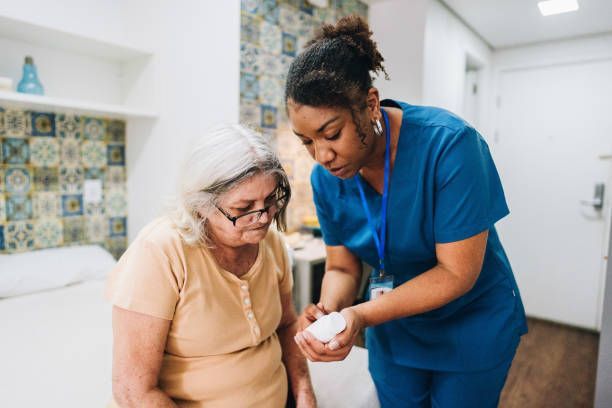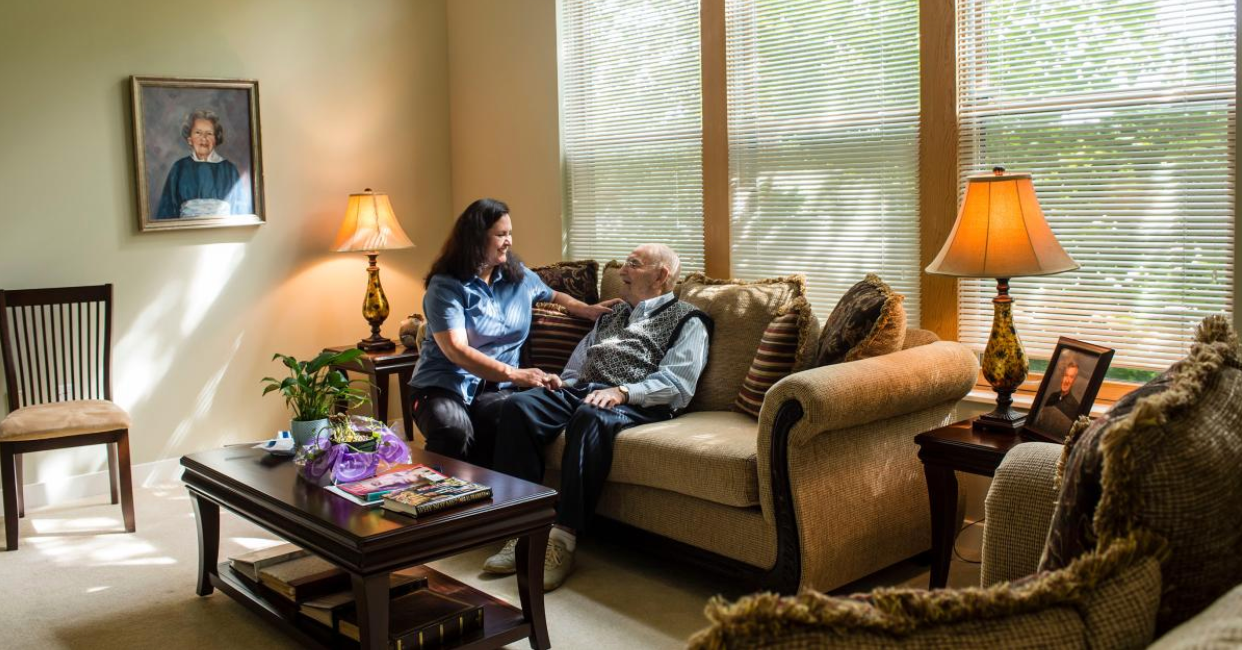Home Care After Parker Jewish Institute: Complete Transition Guide
Home Care After Parker Jewish Institute: Complete Transition Guide
7 Day Home Care provides specialized post-rehabilitation in-home care services for patients discharging from Parker Jewish Institute Rehabilitation, ensuring a safe and seamless transition home. Our care begins with direct coordination with Parker’s social workers and discharge planners, allowing us to understand your treatment plan, therapy goals, and home care needs before you leave the facility. Once home, our Registered Nurses conduct a full assessment, including a home safety risk evaluation and the creation of a personalized care plan tailored to your recovery. We carefully match each client with a Certified Home Health Aide (HHA) trained in post-rehab support—helping with activities of daily living (ADLs), mobility, therapy reinforcement, medication reminders, meal preparation, and light housekeeping. Every case is RN-supervised, with ongoing oversight and care plan adjustments to support your continued progress. As the top private pay home care agency in New York and a leading approved provider for all long-term care insurance carriers, we handle insurance paperwork and scheduling continuity, so families can focus on healing, not logistics. Whether you need hourly, live-in, or 24-hour care, 7 Day Home Care ensures compassionate, skilled, and consistent support after discharge from Parker Jewish Institute Rehabilitation.

What Happens When You Leave Parker Jewish Institute Rehabilitation?
Transitioning from Parker Jewish Institute's world-class post-acute rehabilitation to home represents a critical moment in your recovery journey. You've received intensive physical therapy, occupational therapy, speech therapy, and skilled nursing care—all designed to restore independence and prepare you for home life.
What most families don’t realize is that the first 30 days after discharge are the most critical, with patients facing the highest risk of readmission, falls, and serious setbacks. Without proper support, as much as 20% of rehabilitation progress can be lost in just the first month at home, and a single fall or similar event can derail recovery and permanently impact long-term health and independence.
At 7 Day Home Care, we specialize in bridging this dangerous gap between clinical recovery and independent living. Our post-Parker rehabilitation support ensures continuity of care while helping your loved one remain safe, functional, and confident at home.
How Long Do You Need Home Care After Parker Jewish Institute?
The duration of post-rehabilitation home care varies significantly based on your specific condition and recovery progress:
Examples of Typical timeframes:
- Stroke rehabilitation patients: 4-12 weeks of intensive support
- Orthopedic surgery recovery: 2-8 weeks depending on mobility restoration
- Cardiac rehabilitation: 3-6 weeks with gradual independence
- Pulmonary rehabilitation: 6-10 weeks with respiratory therapy continuation
Factors that determine duration:
- Complexity of medication regimen
- Level of mobility independence achieved
- Family caregiver availability and training
- Home safety modifications needed
- Physician recommendations and insurance coverage
Most patients begin with daily care that gradually reduces to 2-3 times weekly as independence improves.
In some cases, in-home care is required on a permanent basis rather than temporarily after an illness or rehabilitation. Seniors who are bedbound, living with advanced mobility limitations, or experiencing progressive cognitive impairments such as Alzheimer’s or Lewy Body dementia often need continuous support to remain safe and comfortable at home. Permanent in-home care ensures consistent assistance with daily living activities—bathing, feeding, toileting, medication management, mobility transfers, and companionship—while also preventing dangerous complications such as falls, infections, or neglect. Other circumstances may include chronic neurological conditions, advanced heart failure, or respiratory disease, where family caregiving alone may not be sufficient. In these situations, professional home health aides supervised by registered nurses provide families peace of mind, knowing that their loved one’s evolving needs will be met compassionately and reliably for the long term.
What Does Home Care Include After Parker Jewish Institute Discharge?
Our comprehensive post-rehabilitation home care services are specifically designed to continue the progress made at Parker:
Physical Recovery Support
- Communication with Parker therapists and physicians
- Assistance with prescribed home exercises
- Safe transfer and mobility training
- Fall prevention and home safety assessment
- Physical therapy exercise supervision
- Occupational therapy activity reinforcement
Daily Living Assistance
- Personal hygiene and bathing support
- Toileting and continence care
- Transferring and assistance with ambulation
- Meal preparation and feeding following dietary restrictions
- Light housekeeping and laundry
- Transportation or accompaniment to follow-up appointments
- Medication reminders and organization
Family Education and Training
- Proper use of assistive devices (walkers, shower chairs, etc.)
- Safe transfer techniques for family caregivers
- Emergency response protocols
- When to contact medical professionals
What Types of Home Care Schedules Are Available After Parker Jewish Institute?
Home care after Parker Jewish Institute can be arranged on a variety of flexible schedules depending on the patient’s needs and recovery progress:
- Part-Time Care (4–8 hours/day): Ideal for patients who need help with daily routines such as bathing, meals, mobility, and medication reminders while family members provide care during the rest of the day.
- 12-Hour Shifts (Daytime or Overnight): Provides more extended support for patients who require consistent monitoring throughout the day or overnight assistance for safety, toileting, and mobility.
- 24-Hour Live-In Care: Ensures continuous, around-the-clock supervision and support from a dedicated caregiver who remains in the home, offering peace of mind for families with loved ones who need constant attention or face significant mobility or cognitive challenges.
This scheduling flexibility allows families to choose the right balance of professional care and family involvement, with the ability to adjust hours as recovery progresses.
Insurance coverage options:
- Medicare: Covers skilled services and some aide hours with physician orders
- Private insurance: Coverage varies by plan and medical necessity
- Medicaid: May cover extensive hours for eligible patients
- Private pay: Full flexibility in care scheduling and duration
Cost-saving strategies:
- Start with intensive care and gradually reduce hours
- Combine family caregiving with professional support
- Focus on skilled services initially, then transition to companion care
- Utilize insurance benefits strategically
How Do I Choose Home Care After Parker Jewish Institute Rehabilitation?
Selecting the right home care provider after Parker Jewish Institute requires careful consideration of several critical factors:
1. Specialization in Post-Rehabilitation Care
Look for agencies with specific experience in post-acute care transitions. Generic home care providers may not understand the unique needs of rehabilitation patients.
2. Coordination with Parker Jewish Institute
Choose a provider that actively communicates with Parker's discharge planning team and can access your rehabilitation records and therapy goals.
3. Licensed and Trained Staff
Ensure all caregivers are:
- Certified Home Health Aides (HHA) or Personal Care Aides (CNA)
- Trained in rehabilitation support techniques
- Experienced with medical equipment and mobility devices
- Background-checked and insured
4. Nursing Supervision
Select agencies that provide registered nurse oversight, especially important for medication management and medical monitoring in the first weeks after discharge. Registered nurses play a critical role in supporting home health aides whenever home care services are in place, providing clinical oversight, guidance on care plans, and immediate intervention when medical issues arise.
5. Local Presence and Availability
Choose a provider with:
- 24/7 availability for accessibility and emergencies
- Staff familiar with local hospitals and medical facilities
- Quick response times for schedule changes
- Experience serving your specific community
What Should I Expect in My First Week Home from Parker Jewish Institute?
The first week home from Parker Jewish Institute is crucial for preventing setbacks and establishing successful routines:
Day 1-2: Immediate Assessment and Setup
- Home safety evaluation: Identifying fall risks and needed modifications
- Medication review: Ensuring all prescriptions are correctly organized
- Equipment check: Proper setup and training on assistive devices
- Baseline assessment: Documenting current functional abilities
Day 3-5: Routine Establishment
- Daily care schedule: Establishing consistent timing for medications, meals, and exercises
- Therapy continuation: Beginning prescribed home exercises with professional supervision
- Family training: Teaching caregivers proper techniques and emergency protocols
- Medical follow-up: Scheduling and attending first post-discharge appointments
Day 6-7: Adjustment and Refinement
- Care plan modifications: Adjusting support level based on observed needs
- Progress documentation: Recording functional improvements or concerns
- Communication with providers: Updating Parker therapists and physicians on home progress
- Emergency preparedness: Finalizing protocols for urgent situations
How Does 7 Day Home Care Support Parker Jewish Institute Patients?
At 7 Day Home Care, we've developed specialized protocols for Parker Jewish Institute patients based on years of experience with post-acute rehabilitation transitions:
Seamless Transition Planning
We coordinate directly with Parker's discharge planning team, reviewing therapy goals, mobility assessments, and medical needs before you even leave the facility.
Specialized Rehabilitation Support
Our caregivers are trained in:
- Physical therapy exercise supervision and motivation
- Speech therapy communication techniques
- Occupational therapy daily living skills reinforcement
- Cardiac and pulmonary rehabilitation protocols
Medical Management Expertise
Our registered nurses provide:
- Medication reconciliation and management
- Vital sign monitoring per discharge orders
- Communication with physicians and specialists
Family-Centered Approach
We believe family involvement is crucial for long-term success:
- Family caregiver training
- Written care instructions and emergency protocols
- Regular family meetings to discuss progress
- Gradual transition to family-led care when appropriate
When Should I Call for Help After Parker Jewish Institute Discharge?
Knowing when to seek immediate medical attention versus when to contact your home care team is critical for safety:
Call 911 Immediately If:
- Chest pain or difficulty breathing
- Signs of stroke (facial drooping, arm weakness, speech difficulty)
- Severe fall with potential injury
- Uncontrolled bleeding or wound complications
- Loss of consciousness or severe confusion
Contact Your Home Care Team For:
- Medication side effects or questions
- Difficulty with prescribed exercises
- Equipment problems or adjustments needed
- Changes in weight, appetite, sleep, or mood
Contact Parker Jewish Institute Or Your Physician For:
- Worsening of original condition
- New symptoms not addressed in discharge instructions
- Questions about therapy progression
- Medication adjustments needed
- Follow-up appointment scheduling
FAQ: Complete Guide to Post-Parker Home Care
How quickly can home care start after Parker Jewish Institute discharge?
Home care can begin immediately - on the same day of discharge. We coordinate with Parker's discharge team to ensure caregivers are immediately ready when you arrive home.
Will my home care aide know my Parker Jewish Institute therapy goals?
Yes. We review your complete discharge summary and therapy recommendations to ensure continuity of care and proper exercise supervision.
Does insurance cover home care after Parker Jewish Institute?
Medicare and most private insurance plans may cover medically necessary home health services in limited form. Coverage varies based on your specific needs and physician orders.
What if I need more help than expected after coming home?
We continuously assess your needs and can increase care hours immediately. Our nurses evaluate progress weekly and adjust care plans as needed.
How do I know if my recovery is progressing normally at home?
Your Parker discharge team provides specific milestones and timelines. Our nurses monitor progress against these goals and communicate any concerns to your medical team.
Can family members learn to provide some of the care themselves?
Absolutely. We provide informal training to family caregivers and gradually transition care responsibilities as comfort and competence increase.
What happens if I have a medical emergency while receiving home care?
Our caregivers are trained in emergency response protocols. We maintain 24/7 nursing support and have direct communication channels with local emergency services.
How long will I need assistance with medications after Parker Jewish Institute?
Medication management needs vary widely. Some patients need only initial setup and training, while others require ongoing supervision for complex regimens. This is evaluated weekly.
Why Choose 7 Day Home Care for Post-Parker Jewish Institute Support?
Local Expertise in Queens and Long Island
We've served the Parker Jewish Institute community for years, understanding the unique needs of patients from this premier rehabilitation facility. Our administrative team and caregivers know local medical networks, transportation options, and community resources.
Proven Experience with Post-Rehabilitation Care
Our specialized approach to post-Parker rehabilitation support delivers measurable benefits:
- Significantly lower readmission rates through proactive monitoring and intervention
- Higher therapy goal achievement with consistent exercise supervision and motivation
- Exceptional patient and family satisfaction through personalized, compassionate care
- Substantial cost savings compared to extended facility stays while maintaining quality outcomes
Comprehensive Support Network
Unlike general home care agencies, we provide:
- Registered nurse oversight for all post-acute patients
- Direct communication with Parker Jewish Institute therapists
- 24/7 emergency support and clinical backup
- Specialized equipment and supply coordination
Conclusion: Successful Recovery Starts at Home
Your journey at Parker Jewish Institute has prepared you for independence, but the transition home requires continued support and expertise. The first 30-60 days at home are critical for maintaining rehabilitation gains and preventing costly setbacks.
At 7 Day Home Care, we understand that every Parker Jewish Institute patient has unique needs, goals, and challenges. Our personalized approach ensures you receive exactly the right level of support to continue your recovery journey safely and successfully at home.
Don't let the gap between clinical care and independent living derail your progress. Contact 7 Day Home Care today to learn how our specialized post-Parker rehabilitation support can give you confidence, security, and the best chance for long-term recovery success.
Call us today at (516) 408-0034 or visit here to schedule your post-Parker Jewish Institute home care free consultation. 7 Day Home Care is the top private pay and approved long term care insurance provider for in-home care services on Long Island, NYC, Manhattan, Queens, and Brooklyn, New York.
Brian Callahan
7 Day Home Care










